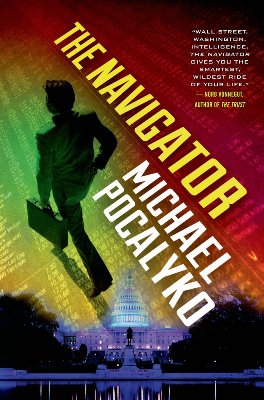 Michael Pocalyko’s financial thriller is one of the most intricately and uniquely plotted novels I’ve ever read that maintains its integrity of suspense and credibility ‘til the very end. Its elements of intrigue are so diverse — cast wide among a World War II mystery, Wall Street power plays, political drama and international wealth conspiracies, let alone the occasional murder – I kept thinking there’s no way this story is going to come together in the end without feeling forced or manipulated. And yet it does, impressively and brilliantly.
Michael Pocalyko’s financial thriller is one of the most intricately and uniquely plotted novels I’ve ever read that maintains its integrity of suspense and credibility ‘til the very end. Its elements of intrigue are so diverse — cast wide among a World War II mystery, Wall Street power plays, political drama and international wealth conspiracies, let alone the occasional murder – I kept thinking there’s no way this story is going to come together in the end without feeling forced or manipulated. And yet it does, impressively and brilliantly.
It’s worth noting the author’s background: Mr. Pocalyko (pronounced “poe-calico”) is CEO of Monticello Capital, a boutique investment bank in Washington D.C. His credentials read like the bio of a Tom Clancy character – combat aviator, Navy commander, political candidate, venture capitalist and global corporate chair. Given fiction often draws from an author’s experience, this gives you an idea of The Navigator’s flavor, and of its rich action and realism.
At the center of the drama is the world’s first trillion-dollar private Wall Street deal for the launch of a new global company named ViroSat, or what some are calling “Internet Next.” It’s a worldwide system of integrated satellites and remote receiving stations that’s so vast it surpasses existing Internet and international telecommunication networks — and it’s beyond regulatory reach.
Pulling the deal together is Warren Hunter of Wall Street investment bank Compton Sizemore. Warren is an arrogant, polished negotiator whose razor-sharp insight elevates him to hero status. He’s financing the deal with four-fifths debt and one-fifth equity. Put another way, total required for the ViroSat deal is $1.37 trillion in new debt and $287.7 billion in equity. Where Warren is to source that equity creates the mystery, along with those wanting to stop Warren from closing the deal, including a former communist spy, deceptive entrepreneurs and people who aren’t who they say they are.
Meanwhile, Warren’s older brother Rick Yeager finds himself unemployed in Washington D. C. when the financial company he joins on his first day gets busted by the FBI for the illegal way it moves “scads” of other people’s money. He also finds himself back in touch with his ex-wife Julia, who works for a U.S. senator hot to get legislative oversight on the ViroSat deal. At the same time, strangely, Rick inherits a former financial client’s estate after she dies in a suspicious car accident. And then there’s Dutch, Warren and Rick’s father, a World War II combat air pilot seconded to military intelligence, now weakened and confused by Alzheimer’s. Pocalyko skillfully orchestrates these many narrative threads, suggesting connection, but it’s not until the end when we understand the why and how of it.
A lot needs to be explained about ViroSat’s capital financing and how massive amounts of money work and move. Pocalyko does a fine job of making sure his readers understand without talking down to us. But with that comes a heavy presence of exposition, i.e., explaining and narratively diagramming how money works in such a deal and also how Wall Street and Washington D.C. play in the arena. While informative, the exposition leaches the prose of color and excitement, rendering this story more interesting than gripping.
At one point, early in The Navigator, Warren whispers to ViroSat’s principal Japanese venture partner, who’s got cold feet: “Business is war. Kill or be killed.” The comment sets the stage for this expertly plotted debut and the memorable Warren Hunter.
